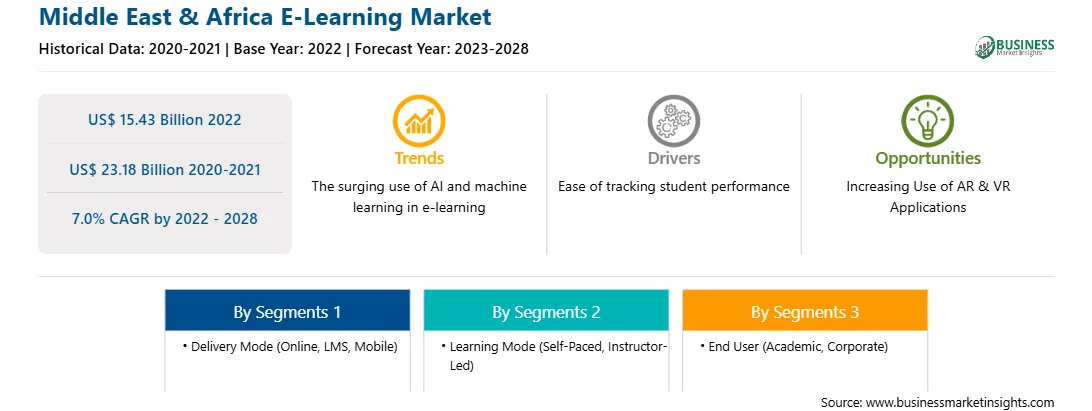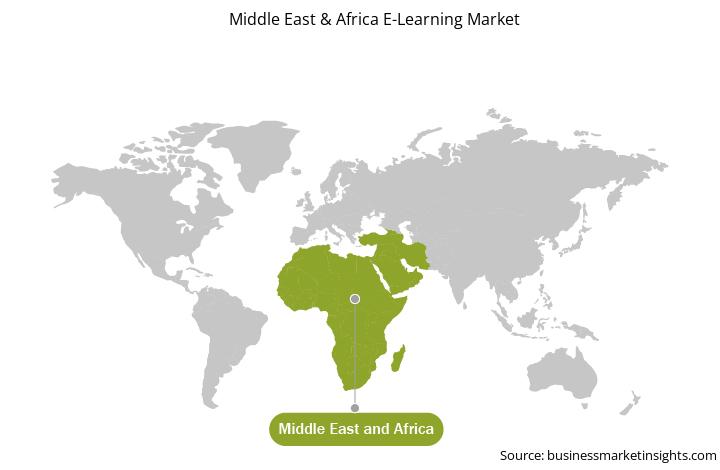Growing Number of Cost-Effective E-Learning Models is Driving the Middle East & Africa E-Learning Market
E-learning models have led to many changes in the educational content accessed, discussed, and shared. It also increases transparency between teachers, students, and parents. E-learning is a cost-effective model, which drives its popularity among parents, who can keep track of their children's daily activities. Moreover, owing to an urge to update existing training programs, many educational institutes consider adding e-learning to the set of existing tools. Due to the increasing development of short-term e-learning models, companies install entire e-learning models for the long term, saving huge amounts on training and development and eliminating major instructor-led training expenses.
E-learning reduces overall training time by 40–60% and helps businesses cut down related expenses, in turn, increasing productivity. With e-learning, users do not need to invest in any special equipment or learning resources for each module of their courses. Learners log in to an app or a portal at any point, removing the need to spend on textbooks or other course materials. Therefore, an increasing number of cost-effective e-learning models propel Middle East & Africa e-learning market growth.
Middle East & Africa E-Learning Market Overview
The Middle East & Africa e-learning market is segmented into Saudi Arabia, the UAE, South Africa, and the Rest of Middle East & Africa. In the Middle East (ME), traditional academic institutions and newly founded online or hybrid educational organizations are still in the early stages of convincing students and their parents to embrace and adapt to the concept of e-learning. While a few traditional colleges have begun to offer a variety of e-learning courses, others are still in the early phases of establishing such programs. However, the increase in acceptance of e-learning solutions, stress on continuous learning practices by organizations, accountability mandates, and the use of cloud technology to speed up the learning process are a few major factors driving the Middle East & Africa e-learning market across the region.
The Middle East & Africa e-learning market growth is attributed to the rising government expenditure in the education sector to increase the adoption of e-learning platforms. The Government of Saudi Arabia is encouraging e-learning programs to promote quality education. For instance, in February 2022, the Ministry of Education and the Saudi Electronic University inaugurated a forum on the future of learning and technology in Riyadh. The forum was established to adopt e-learning strategies and technologies in the education system across MEA countries. Also, various other institutions are undertaking initiatives to adopt e-learning portals, boosting the demand for e-learning solutions, thus fuelling the Middle East & Africa e-learning market growth. For instance, in May 2020, Microsoft partnered with C-Telecoms, Sahara Net, COMM-IT, Jawraa, Future Nas, and Al-Mayssan Technical Services to provide free half-day training on Teams to academic institutions in Saudi Arabia.

Strategic insights for the Middle East & Africa E-Learning provides data-driven analysis of the industry landscape, including current trends, key players, and regional nuances. These insights offer actionable recommendations, enabling readers to differentiate themselves from competitors by identifying untapped segments or developing unique value propositions. Leveraging data analytics, these insights help industry players anticipate the market shifts, whether investors, manufacturers, or other stakeholders. A future-oriented perspective is essential, helping stakeholders anticipate market shifts and position themselves for long-term success in this dynamic region. Ultimately, effective strategic insights empower readers to make informed decisions that drive profitability and achieve their business objectives within the market.

| Report Attribute | Details |
|---|---|
| Market size in 2022 | US$ 15.43 Billion |
| Market Size by 2028 | US$ 23.18 Billion |
| Global CAGR (2022 - 2028) | 7.0% |
| Historical Data | 2020-2021 |
| Forecast period | 2023-2028 |
| Segments Covered |
By Delivery Mode
|
| Regions and Countries Covered | Middle East and Africa
|
| Market leaders and key company profiles |
The geographic scope of the Middle East & Africa E-Learning refers to the specific areas in which a business operates and competes. Understanding local distinctions, such as diverse consumer preferences (e.g., demand for specific plug types or battery backup durations), varying economic conditions, and regulatory environments, is crucial for tailoring strategies to specific markets. Businesses can expand their reach by identifying underserved areas or adapting their offerings to meet local demands. A clear market focus allows for more effective resource allocation, targeted marketing campaigns, and better positioning against local competitors, ultimately driving growth in those targeted areas.

Middle East & Africa E-Learning Market Segmentation
The Middle East & Africa e-learning market is segmented into delivery mode, learning mode, end user, and country.
Based on delivery mode, the Middle East & Africa e-learning market is segmented into online, LMS, mobile, and others. The online segment held the largest Middle East & Africa e-learning market share in 2022.
Based on learning mode, the Middle East & Africa e-learning market is segmented into self-paced and instructor-led. The instructor-led segment held the larger Middle East & Africa e-learning market share in 2022.
Based on end user, the Middle East & Africa e-learning market is segmented into academic and corporate. The academic segment held the larger Middle East & Africa e-learning market share in 2022. Moreover, academic segment is fragmented into K-12 and higher institutions.
Based on country, the Middle East & Africa e-learning market is segmented into Saudi Arabia, the UAE, South Africa, and the Rest of Middle East & Africa. Saudi Arabia dominated the Middle East & Africa e-learning market share in 2022.
Adobe Inc; Cisco Systems Inc; Citrix Systems Inc; Cornerstone OnDemand Inc; and SAP SE are the leading companies operating in the Middle East & Africa e-learning market.
The Middle East & Africa E-Learning Market is valued at US$ 15.43 Billion in 2022, it is projected to reach US$ 23.18 Billion by 2028.
As per our report Middle East & Africa E-Learning Market, the market size is valued at US$ 15.43 Billion in 2022, projecting it to reach US$ 23.18 Billion by 2028. This translates to a CAGR of approximately 7.0% during the forecast period.
The Middle East & Africa E-Learning Market report typically cover these key segments-
The historic period, base year, and forecast period can vary slightly depending on the specific market research report. However, for the Middle East & Africa E-Learning Market report:
The Middle East & Africa E-Learning Market is populated by several key players, each contributing to its growth and innovation. Some of the major players include:
The Middle East & Africa E-Learning Market report is valuable for diverse stakeholders, including:
Essentially, anyone involved in or considering involvement in the Middle East & Africa E-Learning Market value chain can benefit from the information contained in a comprehensive market report.